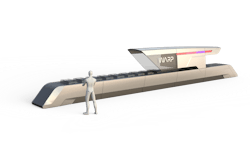Rapid-Action Coronavirus and Bacteria Disinfection Technology for Passenger Luggage at Airports Stops Local Outbreaks from Becoming Global Pandemics
We are all familiar with the x-ray machines that provide traveler security at every airport in the world. Now, imagine comparable machines that provide 99.99 percent disinfection from current and future viruses on carry-on and checked bags, including the SARS-CoV-2 Coronavirus, COVID-19, and unpredictable mutations, as well as bacteria and spores.
In 2021, biohazard disinfection startup WarpUV will deliver just such a machine, known as AirFort, to airports, putting the company at the forefront of preventing present and future global pandemics and serving as a “disinfection firewall” that will contain the spread of contagions from the common cold and seasonal influenzas to deadly viruses, including the newly identified B.1.1.7 COVID-19 mutation recently discovered in the United Kingdom and the 501.V2 strain, which is spreading like wildfire across the world.
In less than 30 seconds the multi patent-pending WarpUV AirFort machines rapidly disinfect all surface contamination from carry-on and checked bags, personal items and oversized bags and parcels before they enter an airport concourse or the plane’s cargo hold – both for incoming and outgoing flights -- ensuring passenger safety from a broad spectrum of pathogens. AirFort utilizes a proprietary 3-D array of ultraviolet lights designed to achieve all-angle “360° x 360°” disinfection of all baggage surfaces. The machines were designed with airports and airlines in mind and integrate seamlessly into airport operations, even during periods of high footfall traffic.
Such biosecurity is urgently needed to contain the spread of rapidly emerging Sars-CoV-2 coronavirus variants that are more contagious or can prolong the pandemic. With research indicating that fighting COVID-19 could cost 500 times as much as pandemic prevention measures, World Health Organization (WHO) senior advisor Bruce Aylward warned earlier this year that “We need to get ready for something that may even be more severe in the future.”
According to the University of Cambridge (England), the global economy could take a hit of some $82 trillion over the next five years in a worst-case scenario from the COVID-19 pandemic, adding that if the recovery is faster, an "optimistic loss" of $3.3 trillion is likely.
The COVID-19 vaccine is not a panacea. Ugar Sahin, BioNTech CEO, reported the deadly virus is going to stay with us for the next decade at least.
According to AirportWatch, global air traffic dropped by 60 percent in 2020 amid travel restrictions due to COVID-19.
With more than 17,500 commercial airports globally serving more than 925 million passengers on nearly 39 million flights in 2019, and with each passenger carrying one or two pieces of luggage onto planes annually, air travel remains one of the most vulnerable means for spreading airborne infectious diseases.
“Airport biosecurity has become an urgent and critical staple of airport security since the COVID-19 containment shut down the vast majority of air traffic, introducing global economic fragility and disrupting mobility,” said WarpUV CEO Amir Fischer, a serial entrepreneur who spent four years in airline and airport security at London Heathrow airport. “With AirFort, airports and airlines can restore passenger safety and help prevent future local outbreaks before they become global pandemics.”
WarpUV sees enormous market potential for AirFort, and the company will scale up quickly. A WarpUV proof-of-concept device is already deployed for efficacy testing at Tel Aviv University’s Shmunis School of Biomedicine and Cancer Research, at the Microbial Pathogenesis Laboratory headed by world-renowned microbiologist Prof. Anat Herskovits. “We are already seeing conclusive confirmation that the WarpUV device achieves rapid and comprehensive disinfection of Corona viruses, as well as other viruses and bacteria,” Herskovits said. She also serves as WarpUV’s head of microbiology.
WarpUV’s business model uses a modest ticket surcharge in lieu of burdening airport authorities with capital expenditures. Airports briefed on the devices have expressed a great deal of interest in WarpUV. With access to nearly one hundred airports via two leading industry distributors, WarpUV already has deals underway representing more than $100 million in revenue.
